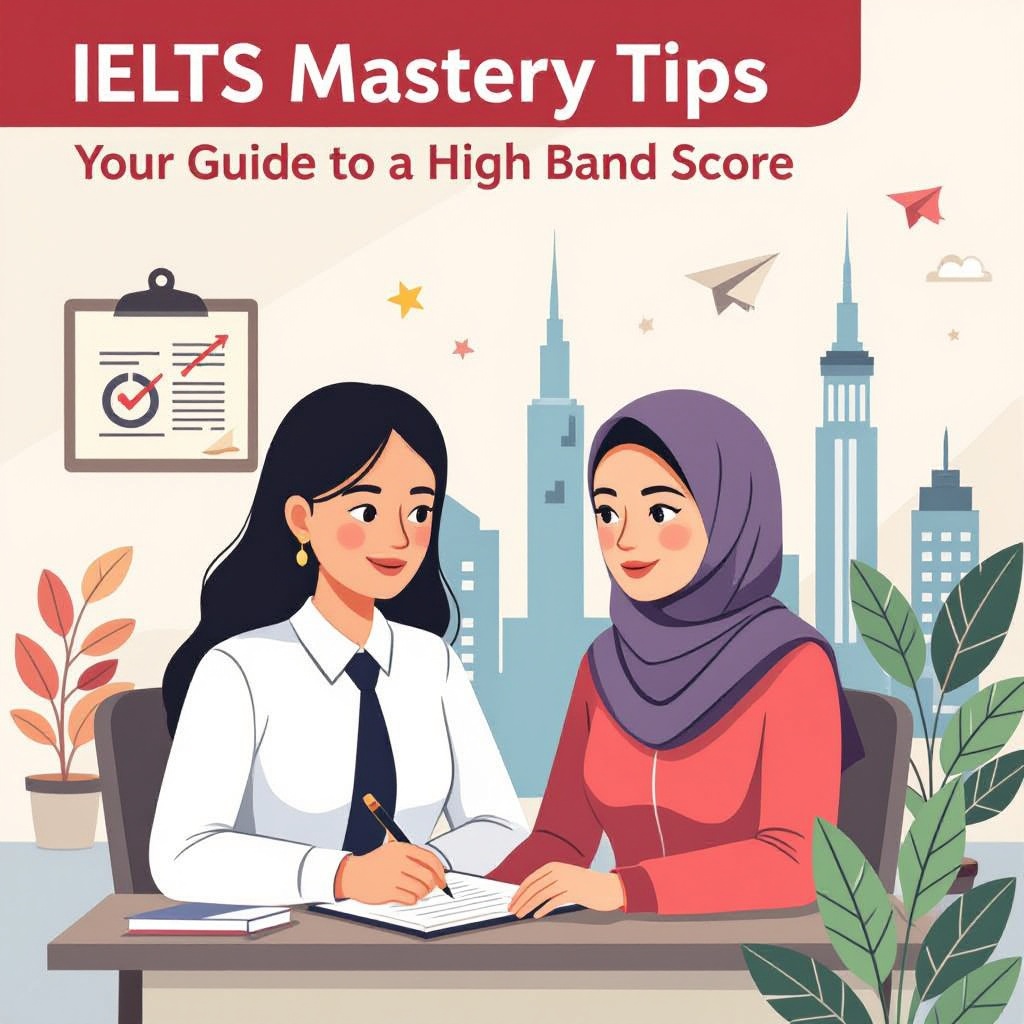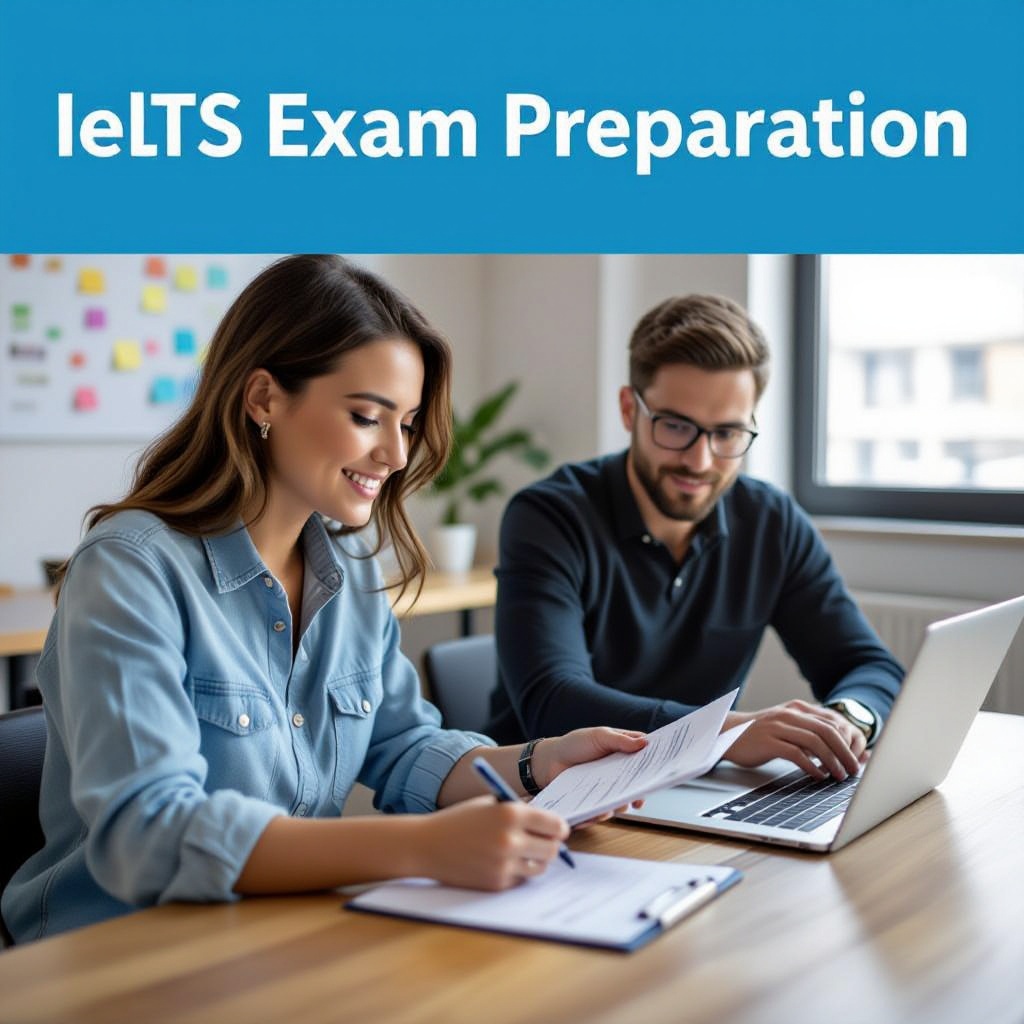For Gulf students aiming to achieve a high band score in the IELTS exam, strategic preparation unlocks a wide array of global academic and career opportunities. Understanding the IELTS test format and employing effective preparation strategies can significantly enhance performance, aligning students with global expectations and competitive opportunities.
Key Takeaways
- An understanding of the IELTS test format, including its four components, is crucial for focused preparation.
- Creating a concentrated 4–8 week study plan with dedicated time for each module can significantly boost preparation.
- Utilizing resources like IELTS Prep by IDP and Road to IELTS by the British Council provides structured guidance.
- Choosing between computer-delivered and paper-based tests should depend on personal strengths and preferences.
- Consistent practice tests and feedback sessions help identify strengths and areas needing improvement.
IELTS Mastery for Gulf Students: Your Guide to a High Band Score
IELTS holds significant global weight, notably in Gulf regions where it’s a crucial step in achieving academic and career goals. Gulf students play a vital role in the IELTS community, with a high band score often being the stepping stone to educational establishments and employment opportunities worldwide. This score can open doors to prestigious universities and desirable job offers.
The exam’s influence in the Gulf is substantial, with students aiming to harness its potential for future success. A commendable score signals proficiency in English, aligning students with global expectations and competitive arenas. Focusing on this can elevate both personal and professional prospects significantly.

Understanding the IELTS Test Format
Familiarity with the IELTS test’s structure can significantly boost your preparation. The exam comprises four components: Listening, Reading, Writing, and Speaking. The Listening section lasts 30 minutes, where you’re assessed on your ability to understand spoken English. The Reading segment spans 60 minutes, testing comprehension of various texts. Writing, another 60-minute part, demands proficiency in expressing ideas coherently. Finally, the Speaking test, lasting 11–14 minutes, evaluates conversational skills.
There are two IELTS versions. The Academic version suits those applying to universities or professional registries, while the General Training version focuses on practical English skills for non-academic purposes, like migration. Gulf students typically aim for a band score between 6.0 and 7.5 to gain entry into prestigious universities.
The test’s importance is evident, with over 3.5 million candidates participating annually worldwide.

Effective Preparation Strategies and Resources
Developing a focused 4–8 week study plan can significantly boost your IELTS score. Set weekly goals; dedicate time each week for specific modules like Listening, Reading, Writing, and Speaking. Utilize mock tests to track progress and make adjustments as needed.
Consider these key resources to aid your preparation:
- IELTS Prep by IDP offers structured material tailored to your needs.
- Road to IELTS by the British Council provides practice tests and interactive exercises.
Major test centers in Gulf cities, such as Dubai and Abu Dhabi, offer excellent facilities. They’re ideal spots for sitting your exam. Online coaching’s role is expanding with platforms offering flexibility and personalized guidance. Leverage these digital options to enhance your study method.
Essential Registration and Test Day Insights
For Gulf students, booking an IELTS test starts online. First, choose between the Academic and General Training tests based on your goals. Next, select a convenient test center. Local testing centers often fill up quickly, so book early to secure your preferred date. Payment of fees happens online as part of the booking.
For test day success, I recommend familiarizing yourself with the test center ahead of time. Visit the location if possible, so you know the commute. Understanding the test format is crucial as each section has its own quirks. Whether to go for the computer-delivered or paper-based test is a pivotal decision, and here’s where practice mocks come into play. These simulations highlight the differences:
- The computer-delivered test allows for typing responses, which can be faster for some candidates.
- In the paper-based test, you’ll answer with a pencil, giving you the chance to change an answer easily by erasing it.
- Listening sections might differ; in the computer-based version, you’ll use headphones, often providing clearer audio quality.
- The timing may feel different; some find they’re able to manage time more effectively on a computer.
Ultimately, select the method that complements your strengths. These steps and considerations form a solid foundation for obtaining that high band score.

Mastering each module is crucial for success, and practical study tips can make the process more efficient and effective. Below, find targeted suggestions for each section of your study journey.
Listening Module
Focus on understanding diverse English accents. Explore English media from various regions to enhance comprehension. Engaging with diversified content will not only improve listening skills but also prepare you for different accents you may encounter.
Reading Section
Employ skimming and scanning techniques to quickly grasp main ideas and locate details. This approach will make it easier to answer questions accurately and quickly, enhancing your ability to manage time during the exam.
Writing Section
For the Writing section, it’s important to structure essays with clarity. Begin with a clear introduction, develop your argument with coherent points, and conclude effectively. Adhering to a structured approach ensures that your essays are logical and easy to follow.
Speaking Module
Speaking requires clarity and coherence. Practice speaking daily, focusing on fluency and pronunciation. Consistent practice can significantly improve your comfort and performance during oral exams.
Regular Practice Tests
Regular practice tests are crucial. Take them under timed conditions to simulate exam pressure and evaluate your progress. This helps identify strengths and areas needing improvement. Follow these strategies consistently for a higher band score.

Additional Success Strategies
Boosting vocabulary and nailing grammar are must-dos to sidestep frequent errors in IELTS. Dive into English newspapers, novels, or online resources to pick up new words. When adding to your vocabulary, focus on learning synonyms and antonyms, as this knowledge can help showcase your language skills effectively.
For grammar, daily practice is essential. Work on exercises that target common pitfalls like subject-verb agreement and tenses. Use online tools for instant checks and feedback on writing samples.
In speaking, focus on expressing ideas clearly rather than stuffing sentences with complex words. Simplicity can make your communication more effective, helping ensure that the examiner grasps your points without struggle. Be yourself and let your personality shine through to make your responses authentic and engaging.
Regular feedback is a game-changer. Engage with educators or leverage online platforms to refine your skills. Personalized insights can highlight weaknesses you might overlook, offering targeted strategies for improvement.
Remember, consistency trumps sporadic bouts of intense study. Embed these strategies into your preparation to steadily inch closer to your goal. Communicating effectively, whether in writing or speaking, requires confidence which grows from clarity and knowledge. Keep pushing boundaries and regularly seek criticism that builds you up.
Sources:
JNS Education – “IELTS Preparation Tips for Middle East Candidates”
Elmadrasah – “The IELTS Exam in the Gulf Countries”
PW.live – “2 Months Study Plan for IELTS”
PW.live – “IELTS 8 Week Study Plan”
YouTube
Market Report Analytics – “IELTS Test Preparation 73217”
Market Report Analytics – “IELTS Test Preparation 73225”
GLS (Global Learning Solutions)
